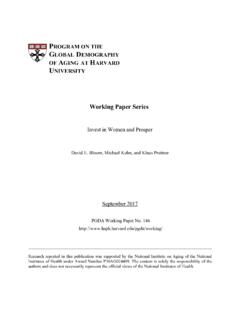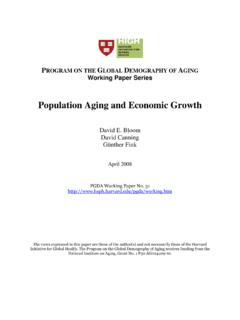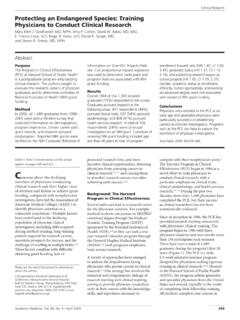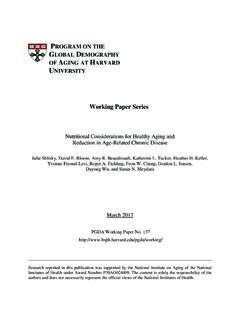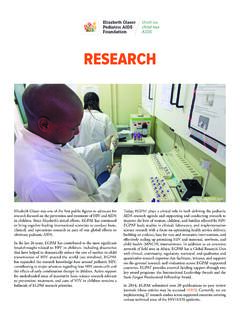Transcription of Rifat Atun is Professor of International Health
1 Rifat Atun is Professor of International Health Management at the Business School and the Faculty of Medicine at Imperial College London. He is Head of The Health Management Group at Imperial College Business School. His research focuses on Health systems reform, innovation in the life sciences, and diffusion of innovations in Health systems. He has published widely in these areas. Between 2008 and 2012 he was a member of the Executive Management Team of the Global Fund to Fight AIDS, Tuberculosis and Malaria in Switzerland as the Director of the Strategy, Performance and Evaluation Cluster. He is Chair of the Stop TB Partnership Coordinating board . Dr. Atun has worked at the UK Department for International Development Health Systems Resource Centre and has acted as a consultant for the World Bank, World Health Organization, and a number of International agencies on the design, implementation and evaluation of Health systems reforms.
2 Dr. Atun has served as a member of the advisory Committee for the WHO Research Centre for Health Development in Japan. He is a member of the pepfar scientific advisory board and the UK Medical Research Council s Global Health Group. He is also a member of the Global Task Force on Expanded Access to Cancer Care and Control in Developing Countries. Dr. Atun studied medicine at University of London as a Commonwealth Scholar and subsequently completed his postgraduate medical studies and Masters in business administration at University of London and Imperial College London. He is a Fellow of the Faculty of Public Health of the Royal College of Physicians (UK), a Fellow of the Royal College of General Practitioners (UK), and a Fellow of the Royal College of Physicians (UK). Till B rnighausen is Associate Professor of Global Health at the Department of Global Health and Population, Harvard School of Public Health (HSPH). Prof. B rnighausen works on the population Health , economic, social and behavioral impacts of global Health interventions, in particular HIV treatment and prevention, and on the organization of Health systems in developing countries.
3 He is a faculty affiliate at the Harvard Center for Population and Development Studies. Prof. B rnighausen has published more than 100 peer-reviewed articles and many book chapters. His research is interdisciplinary, incorporating theoretical and methodological insights from public Health , medicine, economics, epidemiology, the management sciences and demography. He is joint PI on NIH/NICHD grant R01 HD058482-01 (Understanding causal pathways of HIV acquisition and transmission), co-investigator on NIH/NMH 1R01MH083539-01 (The impact of antiretroviral therapy on HIV epidemic dynamics), and co-investigator of the Wellcome-Trust Africa Centre for Health and Population Studies in rural KwaZulu-Natal, South Africa (Africa Centre). His research has also been funded by the European Commission, World Bank, WHO, UNAIDS, Bill & Melinda Gates Foundation, USAID, IDRC Canada, DADD Germany, Elton John AIDS Foundation, Rush Foundation, GAVI Alliance, DFID, and Harvard University.
4 Prof. B rnighausen has previously worked as senior associate for McKinsey & Co, as HIV Epidemiologist and Senior Epidemiologist at the Africa Centre, and as Associate Professor of Population Health at the University of KwaZulu-Natal, South Africa. He also completed a post-doctoral fellowship in Health Systems at Tongji Medical University in Wuhan, China; and he served as Senior Integrated Expert in South Africa for the Center for International Migration, GIZ, Germany. He is a medical specialist in Family Medicine and holds doctoral degrees in International Health (HSPH) and History of Medicine (University of Heidelberg), as well as master degrees in Health Systems Management (London School of Hygiene & Tropical Medicine) and Financial Economics (SOAS, University of London). Peter Berman is Professor of the Practice of Global Health Systems and Economics and Director of Education in the Department of Global Health and Population at the Harvard School of Public Health .
5 He is a Health economist with more than thirty years of experience in research, policy analysis and development, and training and education in global Health . Today he is leading new research programs to develop effective primary care systems in Ethiopia and working on strategies to make Health care financing more effective. He heads the HSPH masters of public Health global Health concentration. He taught at HSPH from 1991-2004 at which time he joined the World Bank. While with the World Bank, Dr. Berman was Lead Health Economist in the New Delhi office (2004-08) and in the HNP anchor department as Practice Leader for the World Bank s Health Systems Global Expert Team (2008-2011). From 1991-2004, Dr. Berman was Professor of the Practice of Population and International Health Economics, the founding director of the International Health Systems Program, and Principal Investigator for two global projects at Harvard: The Data for Decision Making Project, a USAID cooperative agreement which Dr.
6 Berman directed, and The Partnerships for Health Reform, as sub-contractor to Abt Associates. He also led a multi-year study to develop National Health Accounts with the Government of Turkey and numerous other International research collaborations. Dr. Berman has been co-director of the HSPH-World Bank Institute Flagship Global Core Course on Health Sector Reform and Sustainable Financing and directed HSPH s executive education programs in Public-Private Partnerships and National Health Accounts. He is author and editor of five books on global Health economics and numerous academic papers. Dr. Berman holds an and from Cornell University. Theresa S. Betancourt is Associate Professor of Child Health and Human Rights in the Department of Global Health and Population at the Harvard School of Public Health and directs the Research Program on Children and Global Adversity (RPCGA) at the Fran ois-Xavier Bagnoud Center for Health and Human Rights.
7 Her central research interests include the developmental and psychosocial consequences of concentrated adversity on children and families, resilience and protective processes in child and adolescent mental Health and applied cross-cultural mental Health research. She has extensive experience in conducting research among children and families in low resource settings particularly in the context of humanitarian emergencies. She is the Principal Investigator of a prospective longitudinal study of war-affected youth in Sierra Leone and is developing and evaluating a Family Strengthening Intervention for HIV-affected children and families in Rwanda. Previously, Dr. Betancourt worked as a mental Health clinician in both school and community settings and consulted on global children s mental Health issues for various International NGOs and United Nations agencies. She has written extensively on mental Health and resilience in children facing adversity including recent articles in Child Development, The Journal of the American Academy of Child and Adolescent Psychiatry, Social Science and Medicine and PLOS One.
8 Dr. Betancourt received her from the University of Louisville and from Harvard School of Public Health . Robert E. Black is the Edgar Berman Professor and Chair of the Department of International Health and Director of the Institute for International Programs of the Johns Hopkins Bloomberg School of Public Health in Baltimore, Maryland. Dr. Black is trained in medicine, infectious diseases and epidemiology. He has served as a medical epidemiologist at the Centers for Disease Control and worked at institutions in Bangladesh and Peru on research related to childhood infectious diseases and nutritional problems. Dr. Black s current research includes field trials of vaccines, micronutrients and other nutritional interventions, effectiveness studies of Health programs, such as the Integrated Management of Childhood Illness and Integrated Community Case Management approaches for treatment of serious childhood diseases, and evaluation of preventive and curative Health service programs in low- and middle-income countries.
9 Barry R. Bloom is Harvard University s Distinguished Service Professor of the Department of Immunology and Infectious Diseases and Former Dean of the Harvard School of Public Health . He received a bachelor s degree and an honorary ScD from Amherst College, and a PhD from Rockefeller University. Dr. Bloom is widely recognized for his work in the area of infectious diseases, vaccines, and global Health . He has made important discoveries in immunity to tuberculosis and leprosy. He served as a consultant to the White House on International Health Policy from 1977 to 1978, was elected President of the American Association of Immunologists, and served as President of the Federation of American Societies for Experimental Biology. Bloom was an Investigator at the Howard Hughes Medical Institute at the Albert Einstein College of Medicine.. He has received numerous awards for his scientific work including the first Bristol-Myers Award in Infectious Diseases, Robert Koch Gold Medal, and the Novartis Award in Immunology.
10 He has been extensively involved with the World Health Organization (WHO) for more than 40 years. He was a member of the WHO advisory Committee on Health Research and chaired the WHO Committees on Leprosy Research and Tuberculosis Research, and chaired the scientific and Technical advisory Committee of the UNDP/World Bank/WHO Special Programme for Research and Training in Tropical Diseases. He has served on the National advisory Councils of the National Institute of Allergy and Infectious Diseases, NIH, and the Center for Infectious Diseases of the CDC and currently serves on the National advisory board of the Fogarty International Center at NIH. He was elected to membership of the National Academy of Sciences, the Institute of Medicine, the American Academy of Arts and Sciences and the American Philosophical Society. David E. Bloom is Clarence James Gamble Professor of Economics and Demography at the Harvard School of Public Health (HSPH).

